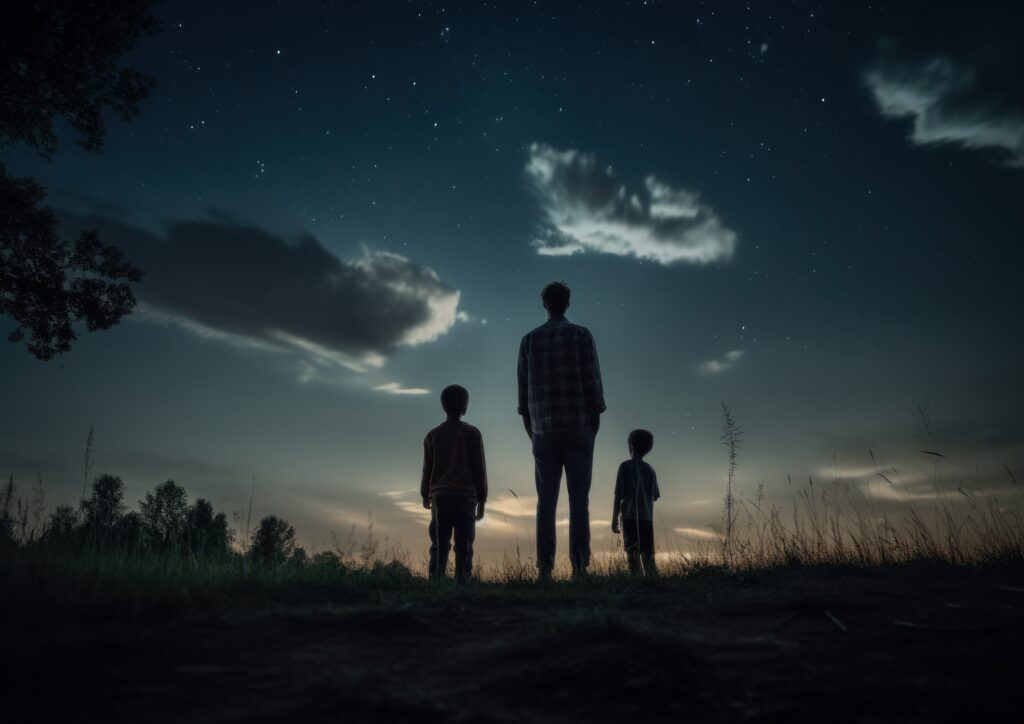Tomorrow (June 30) is National Meteor Watch Day, and that got me thinking about learning astronomy with my kids when they were little. On our library trips, my kids would check out so many books about the planets, the sun, and the stars. One of my kids has an enormous book about the cosmos, and we still love to look at its amazing photos. Kids really do love to learn about the universe, and they are amazed when they are able to spot something in the sky. Since it’s National Meteor Watch Day, it’s a great time to learn about meteors and other space objects. And once you know a bit, you can head out to look at the night sky with your kids!
Learning
We’ll start with learning about the night sky. You can learn the sign for sky. There are so many other things to learn about too!
Meteors
Meteors are a great place to start. The most simple way to explain a meteor is to think of it as a space rock. When it enters our atmosphere, it burns up and leaves a streak of light behind it.
It actually took scientists a long time to figure out what these streaks of light actually were. They learned a lot about them in the 1800s, and started to be able to predict the next meteor shower.
Some meteors are as small as little pebbles, and some are enormous, weighing over 60 tons. And meteors don’t hit only Earth. The craters on the moon came from meteors.
Stars
It’s also fun to learn about the stars and their constellations. The stars are easy to spot and many constellations are easy to find. Hey, this would be a perfect time to learn the sign for stars! There are stargazing apps you can download, or there are simple constellation charts you can get. Do some searching for the perfect tools for your family.
Planets
Planets are another fun topic. They are so different from one another, so colorful, and each so unique. It’s fun to learn about how long a day or a year is on each planet. And kids can enjoy coloring or drawing pictures of the planets. You can even scan or take a photo of their drawings, and then use a photo site to make a book about the planets. Your kids will love showing off their very own planet book, and it’s a great way to help them keep talking about all the fun facts they’ve learned.
There is so much to learn about outer space. There are comets, meteor belts, and nebulas. And there’s the sun, another huge thing to learn about!
You can find books about meteors, stars, constellations, planets, the sun, and other space topics in the children’s section of your library. They have beautiful pictures and lots of fun facts.
My Signing Time has a fun show about The Solar System in the Rachel & the TreeSchoolers series. You can watch it on any device with your My Signing Time digital subscription. Don’t have a subscription? Try it out with a 14-day free trial right here!
Get out to look at the night sky
Summer can be a great time to do some stargazing with your kids, since they can stay up later and sleep in a bit. Even if you live in a city, you can spot some stars and some key constellations. But if you have a chance, try to head out to a dark sky area, or even just somewhere farther from city lights. You and your kids will be amazed at what you can see.
Later this summer, there will be a major meteor shower called the Perseids. It will be active from July 17 to August 24 (in 2023), and you are likely to see several meteors any of those nights. The peak will be around August 13, and that is the time where you could see around 150 meteors per hour.
Winter can also be a great time to look at the night sky. And since it gets darker so much earlier, you won’t be keeping your kids up super late. You’ll just need to bundle up and find ways to stay warm.
There are so many things you can see in the night sky with your own eyes. But if you want to see even more, you can see a lot with a good pair of binoculars. And then there is the telescope. Did you know that some libraries have telescopes that you can check out?
No matter what way you decide to look at the night sky with your kids, make a plan to get out there and enjoy the stars together!

